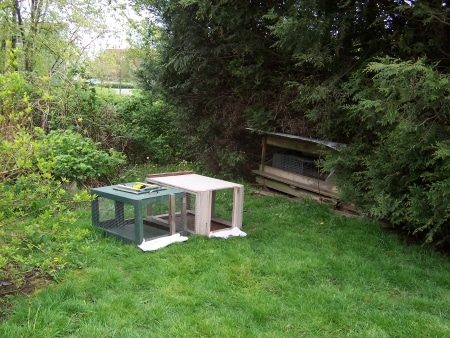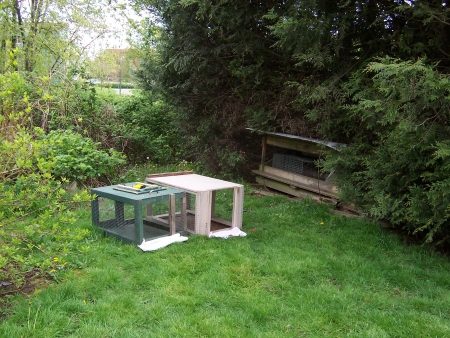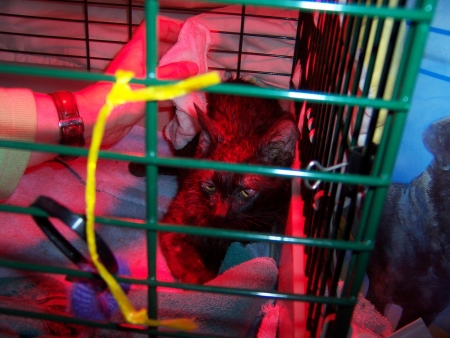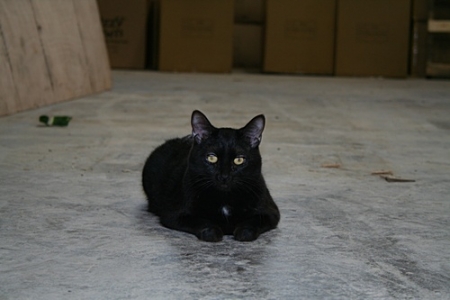

Stakeout nets dozens of unaltered felines
RAPS and Fuzzy Town give healthy start to local cat colony
The tiny dirt path beaten into the grass was the first hint of the colony’s size. A stampede of little paws drummed this pathway as the cats travelled the property, etching out their favorite walking routes.
I was strolling along in Vancouver when the first fuzzy black head popped out of the thorny brush. I called out and further down a second head popped out. A few moments of a friendly voice and there came two more, no doubt anticipating food was forthcoming. The cats were too shy for human touch, but tame enough to recognize a potential caregiver. With four shy cats showing themselves so quickly, more were likely lurking in the shadows.
The owners of the property confirmed initial suspicions. The cats had migrated here one by one as hungry strays seeking sustenance and protection from predators and the elements. The land, six city lots of thorny brush, was ideal – easy for the cats to negotiate but thick enough to keep out larger predators, like coyotes. The family estimated they were feeding about 15 cats. But cats living in colonies have a small gene pool and often look alike, so their numbers are usually underestimated. This case was no exception.
The cats were obviously and beautifully woven into the lives of this family, themselves responsible guardians of four indoor cats. They built a covered feeding station outdoors for meals. A heated porch equipped with cat trees, beds and blankets provided shelter in cold, wet weather. Even the nocturnal nature of the cats was a perfect fit; this family of night owls kept similar hours. It was clear this family loved the cats.
With my light trapping experience of one or two cats at a time, a mission of this scope was way beyond my expertise. I had to call in the professionals. Carol Reichert and her team at the Richmond Animal Protection Society (RAPS) responded quickly.
RAPS was organized, efficient and experienced. Within days, Carol and her assistant, Lisa Weston, met with the homeowners regarding plans for the cats, securing consent. Carol explained there would be a stakeout over the weekend, with blitz trapping followed by transportation of the cats to a local veterinarian for spaying or neutering, flea treatments and ear-tipping. Ear-tipping is the universal signal indicating that a cat is living in a colony. It indicates the cat is altered and has been cared for at some point. Two custom-made wooden traps were left in the yard (doors off) to get the cats comfortable with being around and inside them.
Before Carol left that Thursday, the family told her they were concerned about a very sick cat in the colony. They had tried to catch her many times in vain. She was hiding on the porch, severely afflicted with upper respiratory disease. Green mucus poured from her nose and milky eyes, which were nearly swollen shut. Her mouth hung open as she attempted to gasp in air. She was malnourished, probably because eating felt like choking. She had an ear infection and ringworm. With Carol and Lisa’s know-how and some creative herding techniques, it wasn’t long before she was snuggled into a carrier and on her way into the expert care of the vet’s office. She would owe her life to this rescue. In honor of my stumbling upon the colony, Carol and Lisa named her Little Carreen.
The next day, Friday afternoon, we descended on the property with renewed urgency and fully stocked with the weekend’s supplies: several metal and wood traps, transfer cages, towels and blankets to line transfer cages and cover them, and the bait – canned tuna, salmon, and cat food, along with disposable plates to serve it on.
Carol piqued the interest and palate of the cats by liberally seasoning the grass around the traps with canned tuna and salmon juices. Then she and Lisa settled into the car to wait, poised to pull long strings attached to the pins holding the traps open. It wasn’t long before the cats grew interested in the traps, walking first around and then gingerly into them. With two cats settled down to eat in each trap, Lisa and Carol yanked their strings and the trap doors came sailing down. The cats spun in circles inside the cages in panic as they realized they were trapped, upturning the food bowls and losing all interest in the bait that helped capture them.
The cats were then transferred into smaller cages, where they waited in the vehicle until a full load was caught, about half a dozen cats. We spoke in soft voices so they wouldn’t be frightened. The cages were covered with dark towels. When we ran out of these, we used our coats – the coverings calmed the cats and made them feel protected and secure. Neighbors were supportive and helpful, offering to move their vehicles and clear the way, proving that others in the neighborhood also cared about the fate of the cats.
Working late into the night, the transportation team shuttled the small groups of cats to the animal hospital, where a kind veterinarian and his staff worked around the clock for several days over the weekend tending to the steady stream of animals. They were spayed or neutered, their ears were tipped for identification purposes, and they were treated for a variety of ailments such as fleas and abscesses. One cat required a partial tail amputation.
As the cats were altered, we began returning them to the property, closing them into a screened-in porch attached to the house. With the exception of six cats afflicted with upper respiratory disease, the cats were released back into their forest once the last one was caught several days later. The sick six were contained in a room near the homeowner’s garage and fed antibiotics mixed into wet cat food for two weeks. Five of the trapped cats turn out to be nursing mothers, reinforcing the urgency of the mission. Plans were made for returning to catch the kittens and finish the clean-up of the site.
In all, 28 cats were caught and altered, ending the cycle of death for these cats once and for all.
For the next few weeks, Little Carreen was shuttled back and forth between the vet’s office and the Richmond Animal Protection Society, where a crew of volunteers led by Carol rallied around Little Carreen and nursed her back to health one breath at a time. Little Carreen’s convalescence included high-powered antibiotics, fluids, and vitamin injections. A liquid nutrient supplement boosted her strength, and she basked under a red heat lamp to keep her body warm. She is now the newest resident at Fuzzy Town, a Washington State-based company that sells kids’ toys and pet products.
In every neighborhood, there are people moving out of their homes and leaving their cats behind. Sometimes their new landlord doesn’t allow pets. Other times people simply grow tired of the expense and encumbrance involved in caring for their cats. They mistakenly believe the cats will survive, dumping them like discarded furniture. Perhaps you’ve seen them sitting and looking into the windows of their empty houses, hoping their guardians will return home. Cats are scavengers by nature, and will search for food to fill their empty stomachs. In this case, they happened upon a family who couldn’t refuse the starving creatures.
For those of us who treat our animals like precious companions, it is sad to imagine these cats will never sleep safely at the foot of someone’s bed. Unfortunately the current overpopulation crisis doesn’t afford every cat that luxury. There are striking shortages of available homes. Giving cats who have formed a colony the tools to live a healthier, happier life is often their best option. At least these cats have what millions don’t: food, water, shelter, and a devoted group of human beings who love them.
Little Carreen, the sickest cat in the colony, struggles to survive following her rescue.

After months of pampered convalescence and a couple of minor surgeries to repair her swollen eyes and ears, Little C bounces back to robust health.
Join the newsletter and never miss out on dog content again!
"*" indicates required fields
By clicking the arrow, you agree to our web Terms of Use and Privacy & Cookie Policy. Easy unsubscribe links are provided in every email.
